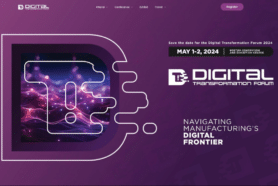
In the age of manufacturing digital transformation and Industry 4.0, the demand for traceability and connecting silos in product lifecycle has never been as high as today. Digital transformation has become a top priority for manufacturing organizations. They are looking at how to develop faster, cheaper, and better. And to do so, companies need to eliminate slowness driven by the reality of using legacy PDM/PLM systems and a massive amount of unstructured downstream data flows via emails, spreadsheets, and other tools. Companies are looking for more speed when it comes to new product development, but also looking at how to get more traceability to support modern product complexity.
Digital Thread is a term that has emerged to describe the virtual representation of a physical product throughout its lifecycle. It enables organizations to manage product data holistically, from design to manufacturing and service. A recent CIMdata industry 2023 forum I attended in Ann Arbor was entirely dedicated to the topic of Digital Threads. CIMdata introduced an interesting topic of the Digital Web, which I will discuss more in my future articles.
Traditional PLM Gaps
Traditional Product Lifecycle Management (PLM) systems have limitations in managing digital threads effectively. Legacy PLM systems were designed to manage product data within an organization’s boundaries, with a single-tenant model. This approach led to data silos, a lack of collaboration, and inefficiencies. Traditional (SQL) database technologies are not as scalable and not as flexible to satisfy the need to trace data connections. As organizations started to collaborate with suppliers, customers, and partners globally, the limitations of existing PLM systems became more pronounced.
Network Model – Multi-Tenant Systems
The need for a new model of managing digital threads emerged. The new model should be based on a network model, with multi-tenant systems. A multi-tenant system allows multiple organizations to use the same system while keeping their data separated. This approach reduces duplication of effort, eliminates data silos, and enables seamless collaboration across the entire supply chain. The network model also provides scalability and flexibility to organizations. As the number of suppliers, customers, and partners increases, the network model can easily scale to accommodate the growth. This provides flexibility to organizations to choose the deployment model that fits their requirements.
One of the elements of the new network model is the multitenant environment in which the system can be used by multiple companies without placing data in a single SQL database repository (like it is done by all legacy PLMs). That alone allows bringing data from multiple companies together without compromising security and not mixing IP that is belonging to multiple companies.
OpenBOM multi-tenant architecture is an example of how multiple companies can manage information on the same platform using OpenBOM instant data sharing and real-time BOM collaboration.
Network Model – Openness and Multi-Cloud Systems
Openness and multi-cloud capabilities are also essential requirements for modern digital thread solutions. Openness allows organizations to connect with other systems and data sources, providing a unified view of product data. Multi-cloud capabilities allows you to communicate and connect with solutions using multiple cloud providers (AWS, GCP, Azure, and others) and provide flexibility and scalability, allowing organizations to manage data across multiple cloud environments.
The importance of the multi-cloud model is growing. A recent review by IDC mentioned PLM service providers TCS delivering solutions in multi-cloud environments.
Conclusion:
Managing digital threads has become critical for organizations in the manufacturing industry digital transformation. Legacy PLM systems have limitations in managing digital threads effectively. The new model of managing digital threads should be based on a network model with multi-tenant systems. Openness and multi-cloud connection capabilities are essential requirements for modern digital thread solutions. OpenBOM is a cloud-based digital thread platform that meets these requirements and enables organizations to manage product data seamlessly across the entire value chain from design to maintenance OpenBOM’s network model approach, openness, and multi-cloud capabilities provide organizations with the scalability, flexibility, and collaboration required to manage digital threads effectively.
REGISTER FOR FREE to get a 14-day trial and learn how OpenBOM can help.
Best, Oleg
Join our newsletter to receive a weekly portion of news, articles, and tips about OpenBOM and our community.










